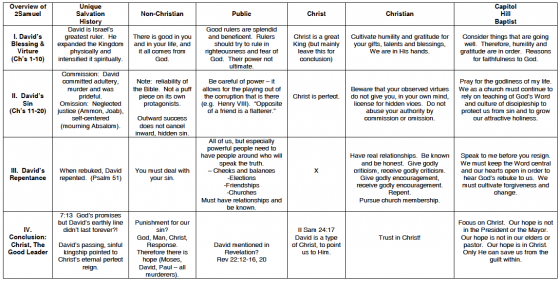"Here’s what I’ve learned. The difference between forgettable vacations
and unforgettable vacations is not the location or attractions. Nope. The
difference between forgettable and unforgettable vacations is the father’s
attitude and leadership. This makes all the difference.
Family vacations provide a unique opportunity each year for fathers to
create memories their children will never forget. Memories that will last a
lifetime. Memories that will be recreated by your children with your
grandchildren. Memories that will outlive a father. But in order to create
these memories, a father must be diligent to serve and lead during
a vacation. How a father views his role on a vacation will make all the difference
in the vacation."
1 Timothy 4:7: Have nothing to do with irreverent, silly myths. Rather train yourself for godliness;
Saturday, May 29, 2010
Dads: Leadership and Family Vacations
Day in and Day Out
I once assumed the gospel was simply what non-Christians must
believe in order to be saved, but after they believe it, they advance to deeper
theological waters. Jonah helped me realize that the gospel isn’t the first step
in a stairway of truths but more like the hub in a wheel of truth. As Tim Keller
explains it, the gospel isn’t simply the ABCs of Christianity, but the
A-through-Z. The gospel doesn’t just ignite the Christian life; it’s the fuel
that keeps Christians going every day. Once God rescues sinners, his plan isn’t
to steer them beyond the gospel but to move them more deeply into it. After all,
the only antidote to sin is the gospel—and since Christians remain sinners even
after they’re converted, the gospel must be the medicine a Christian takes every
day. Since we never leave off sinning, we can never leave the gospel.This idea that the gospel is just as much for Christians as for non-Christians may
seem like a new idea to many, but, in fact, it is really a very old idea. In his
letter to the Christians of Colossae, the apostle Paul quickly portrays the
gospel as the instrument of all continued growth and spiritual progress for
believers after conversion: “All over the world,” he writes, “this gospel is
bearing fruit and growing, just as it has been doing among you since the day you
heard it and understood God’s grace in all its truth” (Col. 1:6 NIV).After meditating on Paul’s words here, a friend once told me that all our problems in
life stem from our failure to apply the gospel. This means we can’t really move
forward unless we learn more thoroughly the gospel’s content and how to apply it
to all of life. Real change does not and cannot come independently of the
gospel, which is the good news that even though we’re more defective and lost
than we ever imagined, we can be more accepted and loved than we ever dared
hope, because Jesus Christ lived, died, and rose again for sinners like you and
me. God intends this reality to mold and shape us at every point in every way.
It should define the way we think, feel, and live.Martin Luther often employed the phrase simul Justus et peccator to describe his condition as a Christian. It means “simultaneously justified and sinful.” He understood that while he’d already been saved (through justification) from sin’s penalty, he was in daily need of salvation from sin’s power. And since the gospel is the “power of God for salvation” (Rom. 1:16), he knew that even for the most saintly of saints the gospel is wholly relevant and vitally necessary—day in and day out.
This means that heralded preachers need the gospel just as much as hardened
pagans. (16-17)
Monday, May 24, 2010
Great Bible Study Tool
The Between Two Worlds blog highlights here an excellent tool developed by 9Marks Ministries to use to when reading a biblical text, to draw out the main points of the passage you are reading:
"The application grid is a helpful tool from 9Marks that can serve pastors preparing sermons, as well as all of us when reading biblical texts. The grid has you examine how the main point of a passage applies to six areas:
- Unique salvation-historical. Does the main point address a text that thrusts forward the unfolding plot of redemption in history?
- Individual Non-Christian. Does the main point have implications for the unbeliever’s thinking, behavior, or motivations?
- Public. Does the main point have implications for how we conduct ourselves in the public squares of commerce, politics, justice, etc . . . ?
- Christological. Does the main point have implications for how we think about Christ Himself?
- Individual Christian. Does the main point have implications for my own persona discipleship to Christ?
- Local church. Does the main point have implications for how we conduct ourselves as an assembled congregation or in our corporate life together?
To print out a blank grid in PDF, click on the image below. Following the blank grid, there’s one filled out from an overview of 2 Samuel."
Friday, May 14, 2010
Reaching the Next Generation
Kevin DeYoung is fast becoming one of my favorite bloggers to read regularly. I urge everyone to read his latest series of blog posts on "Reaching the Next Generation" (i.e. our youth). Here's a sampling from the post entitled Reaching the Next Generation: Hold Them With Holiness :
"One of our problems is that we have no done a good job of modeling Christian faith in the home and connecting our youth with other mature Christian adults in the church. One youth leader has commented that how often our young people “attended youth events (including Sunday school and discipleship groups) was not a good predictor of which teens would and which would not grow toward Christian adulthood.” Instead, “almost without exception, those young people who are growing in their faith as adults were teenagers who fit into one of two categories: either (1) they came from families where Christian growth was modeled in at least one of their parents, or (2) they had developed such significant connections with adults within the church that it had become an extended family for them.” Likewise, sociologist Christian Smith argues that though most teenagers and parents don’t realize it, “a lot of research in the sociology of religion suggests that the most important social influence in shaping young people’s religious lives is the religious life modeled and taught to them by their parents.”
The take home from all this is pretty straight forward. The one indispensable requirement for producing godly, mature Christians is godly, mature Christians. Granted, good parents still have wayward children and faithful mentors don’t always get through to their pupils. But in the church as a whole, the promise of 2 Peter 1 is as true as ever. If we are holy, we will be fruitful. Personal connections with growing Christians is what the next generation needs more than ever."
I am thankful for posts like this that remind me of the call God has for my life as a father, and that call me to repent for living forgetful of this truth so often.
Followup on MTD
See this article, On “Moralistic Therapeutic Deism” as U.S. Teenagers’ Actual, Tacit, De Facto Religious Faith for a very good summary article of the book's primary findings.
Facebook and Privacy...things to Consider
"I live a public life through Twitter, the blog and my Facebook public page, but I also think it's important to have the freedom to limit what I share. Facebook no longer agrees and, since it is their system, I deleted my personal page yesterday. My friend Bill Kinnon is out as well. Read his thoughts here.
Facebook has decided that I cannot stay on, connect with a couple hundred friends, and interact without being listed for all to see. For what it is worth, if I were you, I would have concerns about the continual erosion of privacy that Facebook represents. Simply put, Facebook is increasingly unconcerned about privacy. Again, as Wired magazine explained, Facebook has gone rogue."
To read more about his concerns, check out the whole article here.
Sunday, May 9, 2010
Moralism (Religion) vs the Gospel
RELIGION: I obey-therefore I’m accepted.
THE GOSPEL: I’m accepted-therefore I obey.
RELIGION: Motivation is based on fear and insecurity.
THE GOSPEL: Motivation is based on grateful joy.
RELIGION: I obey God in order to get things from God.
THE GOSPEL: I obey God to get to God-to delight and resemble Him.
RELIGION: When circumstances in my life go wrong, I am angry at God or my self, since I believe, like Job’s friends that anyone who is good deserves a comfortable life.
THE GOSPEL: When circumstances in my life go wrong, I struggle but I know all my punishment fell on Jesus and that while he may allow this for my training, he will exercise his Fatherly love within my trial.
RELIGION: When I am criticized I am furious or devastated because it is critical that I think of myself as a ‘good person’. Threats to that self-image must be destroyed at all costs.
THE GOSPEL: When I am criticized I struggle, but it is not critical for me to think of myself as a ‘good person.’ My identity is not built on my record or my performance but on God’s love for me in Christ. I can take criticism.
RELIGION: My prayer life consists largely of petition and it only heats up when I am in a time of need. My main purpose in prayer is control of the environment.
THE GOSPEL: My prayer life consists of generous stretches of praise and adoration. My main purpose is fellowship with Him.
RELIGION: My self-view swings between two poles. If and when I am living up to my standards, I feel confident, but then I am prone to be proud and unsympathetic to failing people. If and when I am not living up to standards, I feel insecure and inadequate. I’m not confident. I feel like a failure.
THE GOSPEL: My self-view is not based on a view of my self as a moral achiever. In Christ I am “simul iustus et peccator”—simultaneously sinful and yet accepted in Christ. I am so bad he had to die for me and I am so loved he was glad to die for me. This leads me to deeper and deeper humility and confidence at the same time. Neither swaggering nor sniveling.
RELIGION: My identity and self-worth are based mainly on how hard I work. Or how moral I am, and so I must look down on those I perceive as lazy or immoral. I disdain and feel superior to ‘the other.’
THE GOSPEL: My identity and self-worth are centered on the one who died for His enemies, who was excluded from the city for me. I am saved by sheer grace. So I can’t look down on those who believe or practice something different from me. Only by grace I am what I am. I’ve no inner need to win arguments.
RELIGION: Since I look to my own pedigree or performance for my spiritual acceptability, my heart manufactures idols. It may be my talents, my moral record, my personal discipline, my social status, etc. I absolutely have to have them so they serve as my main hope, meaning, happiness, security, and significance, whatever I may say I believe about God.
THE GOSPEL: I have many good things in my life—family, work, spiritual disciplines, etc. But none of these good things are ultimate things to me. None of them are things I absolutely have to have, so there is a limit to how much anxiety, bitterness, and despondency they can inflict on me when they are threatened and lost.

